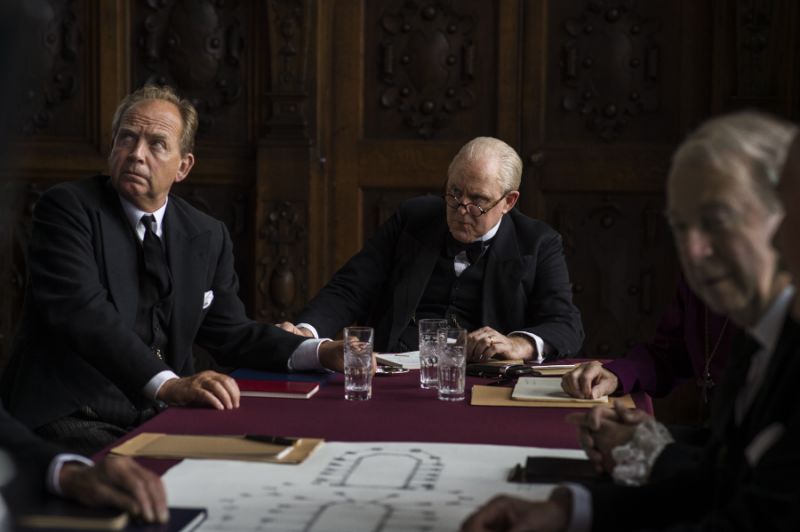The Power of Words: Winston Churchill
My wife and I, both dedicated fans of British dramas and novels of morals and manners, recently watched Netflix’s The Crown, a dramatic interpretation of Queen Elizabeth II’s ascendancy to the throne of the United Kingdom and the early days of her reign. The Crown is a wonderful series with superb story-telling, gorgeous costumes, luxurious sets, and subtle acting. The show serves as a soothing balm for our age of anxiety and anger in the United States.
John Lithgow’s masterful portrayal of the legendary statesman Winston Churchill stands out as the most brilliant ingredient of the series. Lithgow’s characterization and Peter Morgan’s scripts created a complex, magnetic figure: The Crown‘s Churchill has haunted me for weeks.

John Lithgow as Winston Churchill in The Crown (Courtesy of Netflix).
Churchill was many things in his lifetime: soldier, journalist, parliamentarian, painter, writer, and wartime leader. Long before his contemporaries, he perceived the existential threat of fascism and its most powerful and skillful proponent, Adolf Hitler. He rallied the British people after disastrous military defeat and inspired them to defend the last redoubt of Western European civilization–the British Isles, their home–against Nazi Germany. Churchill will be counted as one the great leaders of the world and will be studied for centuries by historians, diplomats, and politicians (presuming that liberal thought and the humanities reign supreme).
Churchill’s power lay not in his charisma, physical prowess, or wealth: his gift with the English language made him a giant among mortals. His words–their ability to inspire his fellow man, to convey an ideal, to build a story–propelled him onto the forefront of the world stage and promised him a firm place in history. The show emphasized this point with several key scenes.
After the death of King George VI, ambitious members in the Conservative Party detected an opportunity to push aside the aging Churchill. However, Churchill delivered a poignant and poetic eulogy to the fallen monarch. While listening to Churchill on the radio, his political rivals appeared utterly crestfallen: he had outmaneuvered and beaten them with oratory. With words.
In a different episode, the opposition Labour Party plotted a vote of no confidence in reaction to Churchill’s poo-pooing of a deadly smog afflicting London. After visiting a hospital, Churchill craftily recognized a powerful public relations opportunity. Churchill instructed his aide to inform the newspapers that he was visiting smog victims. The camera later revealed Churchill quickly jotting down his speech on a prescription pad, whispering the words to himself, trying to get each one just right.
Before watching The Crown, my knowledge of Winston Churchill was limited to high school and college studies and an occasional documentary on the Second World War. Now, I want to read a biography of this towering, great man. I need to know Winston Churchill.
It truly is a superb series. I absolutely agree, there’s this in-depth portrayal of Winston and its quite personal, you do learn of his infant daughters passing which i had to idea about. I for one will definitely be reading more about him !
The storyline with Churchill and the portrait artist was great, yet sad. I agree: the series humanized Churchill in a very real way. Thanks for reading and sharing your thoughts.